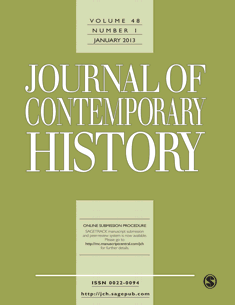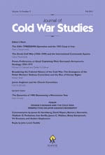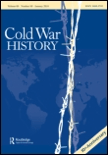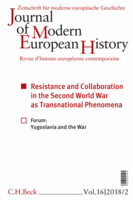
JOURNAL OF CONTEMPORARY HISTORY
Scope & Guideline
Navigating the Complexities of Modern Historical Discourse
Introduction
Aims and Scopes
- Transnational Histories:
The journal explores historical narratives that transcend national boundaries, examining how global interactions shape local events and identities. - Political and Social Movements:
It focuses on the analysis of political ideologies, social movements, and their impacts on contemporary societies, particularly in the context of decolonization and civil rights. - Cultural Memory and Heritage:
The journal emphasizes the significance of memory and heritage in understanding contemporary conflicts and societal transformations, addressing how history is remembered and represented. - Cold War Studies:
A core area of focus includes the Cold War's influence on international relations, cultural exchanges, and domestic policies across various nations. - Human Rights and Social Justice:
It addresses historical perspectives on human rights issues, examining the evolution of advocacy and activism in various sociopolitical contexts. - Environmental History:
The journal increasingly incorporates environmental considerations, exploring the historical interactions between societies and their environments.
Trending and Emerging
- Postcolonial Studies:
There is a growing emphasis on postcolonial narratives, focusing on the legacies of colonialism and the complexities of identity, resistance, and memory in formerly colonized nations. - Environmental Justice:
Research examining the intersection of environmental issues and social justice is on the rise, reflecting an increasing awareness of ecological concerns within historical contexts. - Digital History and New Media:
The journal is beginning to explore the implications of digital technologies on historical research and representation, including how social media shapes collective memory. - Gender and Sexuality Studies:
Themes surrounding gender and sexuality are being increasingly integrated into contemporary historical analyses, exploring how these identities intersect with broader social movements. - Refugee and Migration Studies:
The examination of historical perspectives on migration and refugee experiences is emerging as a significant area of focus, particularly in the context of contemporary global crises. - Globalization and its Discontents:
Research addressing the historical roots and impacts of globalization, including its social, economic, and political ramifications, is becoming increasingly prominent.
Declining or Waning
- Traditional Military History:
There is a noticeable decrease in the publication of papers centered solely on military history without broader social or cultural contexts, suggesting a shift towards more interdisciplinary approaches. - Eurocentrism in Historical Narratives:
Papers that focus exclusively on European perspectives are becoming less common, as the journal increasingly embraces diverse global viewpoints and narratives. - Isolationist Historical Studies:
Research centered on isolated national histories without connections to transnational or global contexts is waning, indicating a preference for interconnected analyses. - Narrowly Defined Historical Events:
Topics that cover highly specific historical events without broader implications or connections to contemporary issues are being published less frequently.
Similar Journals

Casopis za Suvremenu Povijest
Charting New Territories in Historical ResearchCasopis za Suvremenu Povijest, published by the reputable HRVATSKI INST POVIJEST, is a pivotal journal in the field of contemporary history, particularly significant to scholars focused on Croatian and broader Eastern European historical narratives. With an ISSN of 0590-9597 and an E-ISSN of 1848-9079, this journal has established its standing as a Q2 ranked publication within its discipline, showcasing its high-quality research contributions as reflected in its 68th percentile rank among its peers in Scopus. Operating without an open access model, the journal offers a wealth of scholarly articles that discuss intricate historical themes and dynamics, making it an essential resource for researchers, professionals, and students who aim to deepen their understanding of contemporary historical issues. From its operational years starting in 2001 and converging from 2013 to 2023, the journal continues to serve as a vital forum for innovative historical research and discourse in Croatia and beyond.

RUSSIAN HISTORY-HISTOIRE RUSSE
Unveiling Russia’s Historical TapestryRUSSIAN HISTORY-HISTOIRE RUSSE is a distinguished academic journal published by BRILL, focusing on the rich and complex tapestry of Russian historical studies. Established in 1975, this journal serves as a vital platform for scholars, researchers, and students interested in exploring the multifaceted aspects of Russia's past. With its ISSN 0094-288X, it has undergone significant evolution over the years, marking its converged publication years as essential milestones in the academic discourse surrounding Russian history. While currently not an open access journal, it is recognized for its rigorous peer-reviewed articles and contributes to the field's scholarship, as reflected in its 2023 Scopus ranking within the 49th percentile (Rank #876 out of 1760) in Arts and Humanities - History, and its Q4 quartile classification. Located in Leiden, Netherlands, the journal is committed to enhancing understanding of both historical patterns and contemporary implications, making it an essential resource for academic inquiry and research excellence.

Historia y Politica
Navigating the Complexities of History and GovernanceHistoria y Política is a prestigious academic journal published by the CENTRO ESTUDIOS POLITICOS CONSTITUCIONALES in Spain, recognized for its in-depth exploration of historical and political dynamics. With an ISSN of 1575-0361 and E-ISSN 1989-063X, this journal holds a significant place in the academic community, categorizing itself within Q2 in History and Q3 in Sociology and Political Science as of 2023. Spanning published works from 1999 to 2024, it focuses on a diverse array of subjects related to historical phenomena and their political implications, appealing to researchers, professionals, and students seeking to understand the intricate connections between past events and contemporary political landscapes. The journal does not currently offer open access; however, its rigorous peer-review process ensures that each publication meets high scholarly standards. With Scopus ranking it in the 74th percentile for History and 32nd percentile for Sociology and Political Science, Historia y Política continues to contribute valuable insights and foster critical discussions in its fields of expertise.

Journal of Cold War Studies
Decoding History: Insights from the Cold War EraJournal of Cold War Studies, published by MIT PRESS, is a premier academic journal dedicated to the rigorous analysis of the Cold War period and its enduring impact on contemporary international relations and political dynamics. With an ISSN of 1520-3972 and an E-ISSN of 1531-3298, this journal provides a platform for scholarly discourse that advances understanding in the field of history, recognized with a Q1 ranking in History and a Q3 ranking in Political Science and International Relations for 2023. Spanning from 2011 to 2024, it offers a wealth of interdisciplinary studies that appeal to researchers, professionals, and students alike. Its impressive Scopus Rankings highlight its credibility, especially within the top 12% for History and a respectable positioning within Political Science. Readers can expect insightful articles that dissect the complexities of Cold War ideologies, policies, and legacies, making it an invaluable resource for those keen on understanding both historical and contemporary global issues.

Revista Historia-Debates e Tendencias
Illuminating the Past, Shaping the Future of Historical StudiesRevista Historia-Debates e Tendencias is a prestigious academic journal dedicated to the study of historical themes, discourses, and trends in the field of history and social sciences. Published by UNIV PASSO FUNDO, this journal has been a vital resource for scholars and practitioners in Brazil and beyond since it transitioned to an Open Access model in 2007, ensuring that research is freely accessible to all. With its ISSN 1517-2856 and E-ISSN 2238-8885, the journal aims to foster critical discussions and inter-disciplinary dialogues on historical narratives, methodologies, and perspectives. By providing a platform for both emerging and established researchers, it plays an essential role in advancing the field of history while contributing to the global academic community. As a publication that encourages innovative research and scholarly debate, Revista Historia-Debates e Tendencias serves as an indispensable tool for anyone engaged in historical inquiry and analysis.

Acta Historica Tallinnensia
Showcasing Innovative Perspectives on HistoryActa Historica Tallinnensia, published by the Estonian Academy Publishers, is a prominent open-access journal dedicated to the field of history. Since its inception in 2008, the journal has aimed to serve as a vital platform for scholarly dialogue and innovative research developments in historical studies. With an impact factor placing it in the fourth quartile in the history category, this journal provides a unique opportunity for researchers, professionals, and students to disseminate their findings and engage with contemporary historiographical debates. Accessible to a global audience since 2021, Acta Historica Tallinnensia not only highlights the richness of Estonian history but also encourages contributions from diverse historical contexts, creating a vibrant discourse for history enthusiasts. Its ISSN is 1406-2925 and E-ISSN is 1736-7476, further ensuring its credibility and reach. Based in Tallinn, Estonia, the journal fosters scholarly collaboration and aims to increase visibility for emerging voices in the discipline.

REVUE D HISTOIRE MODERNE ET CONTEMPORAINE
Illuminating the Path of Historical ScholarshipREVUE D HISTOIRE MODERNE ET CONTEMPORAINE, published by the Société d'Histoire Moderne et Contemporaine, serves as a vital platform for scholars and enthusiasts in the field of history. With a focus on modern and contemporary historical discourse, this journal has been pivotal since its inception, aiming to promote research, analysis, and debate surrounding pivotal historical developments from the 1970s to the present day. While maintaining a Q4 ranking in History according to Scopus and a 49th percentile placement among arts and humanities journals, it continues to foster scholarly engagement across diverse topics within modern history. Although not an open-access publication, REVUE D HISTOIRE MODERNE ET CONTEMPORAINE offers researchers detailed insights that are crucial for understanding historical narratives and methodologies. Its location in the heart of Paris also symbolizes its commitment to accessing diverse historical perspectives. This journal invites contributions that expand the boundaries of contemporary historical study and enrich academic dialogue.

Cold War History
Charting the Course of Cold War ImpactsCold War History is a leading academic journal published by Routledge Journals, Taylor & Francis Ltd, focusing on the intricate dynamics and historical implications of the Cold War era. With an ISSN of 1468-2745 and an E-ISSN of 1743-7962, this journal offers a rigorous platform for researchers, professionals, and students interested in the fields of history and political science. Recognized as a Q2 journal in History and a Q3 in Political Science and International Relations for 2023, it ranks impressively within its categories on Scopus, attaining a percentile of 84th in Arts and Humanities and 44th in Social Sciences. Covering the extensive period from 2000 to 2024, Cold War History aims to illuminate the multifaceted narratives and consequences of this pivotal epoch, fostering an understanding of its ongoing impact in contemporary politics and society. Although it is not an Open Access journal, it remains an essential resource for those eager to delve into the complexities of historical and political studies.

Soviet and Post Soviet Review
Exploring legacies, shaping futures.Soviet and Post Soviet Review is a prestigious academic journal published by BRILL, located in the Netherlands, focusing on the historical, sociological, and political dimensions of Soviet and post-Soviet societies. With the ISSN 1075-1262 and E-ISSN 1876-3324, this journal serves as a critical platform for researchers, professionals, and students interested in the complexities of social transformations in post-Soviet contexts. Considering its impact factor and Category Quartiles positioning—Q3 in History and Q4 in Sociology and Political Science—it is well-regarded in the academic community, showcasing high-quality, peer-reviewed articles that contribute to ongoing dialogues in these fields. The journal features a diverse array of research articles, reviews, and critical essays, fostering an understanding of historical narratives and contemporary challenges within the region. With a publication history that dates back to 1974, the Soviet and Post Soviet Review remains a vital resource for those seeking in-depth insights into the socio-political landscapes shaped by Soviet legacies and their ongoing implications.

Journal of Modern European History
Charting New Frontiers in European Historical ResearchThe Journal of Modern European History, published by SAGE PUBLICATIONS LTD, is an essential resource for scholars and practitioners in the field of history, particularly focusing on modern European developments. With an ISSN of 1611-8944 and E-ISSN of 2631-9764, this journal boasts a reputation as a Q2 journal in the Arts and Humanities - History category, ranking in the top 25% of its field with a Scopus rank of #404 out of 1760 publications. With its converged years spanning from 2010 to 2024, this journal aims to provide cutting-edge research articles that deepen the understanding of modern European historical events, themes, and methodologies. As a pivotal platform for scholarly discourse, it supports vibrant academic exchange while offering avenues for researchers, professionals, and students to engage with innovative thought in the history domain. For those seeking to expand their knowledge or contribute to the field, the Journal of Modern European History serves as a vital tool for both insight and inspiration.